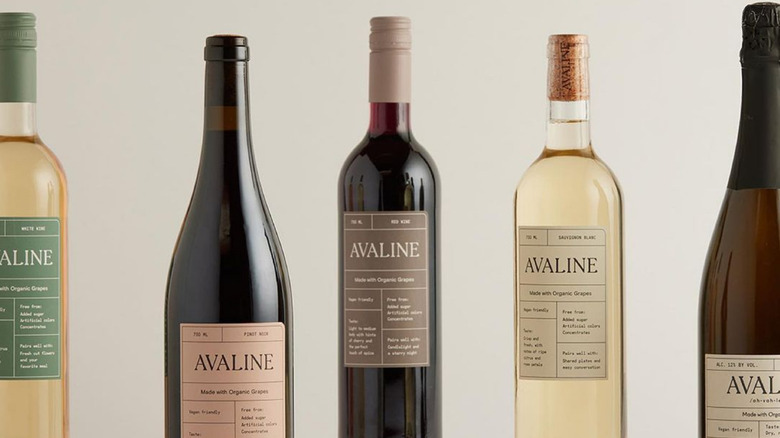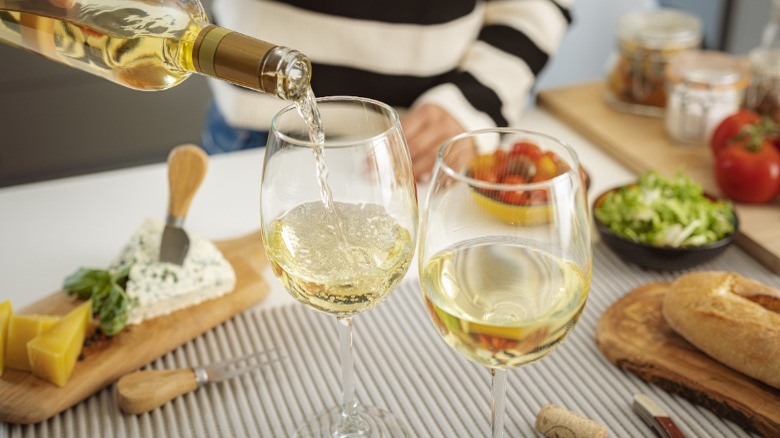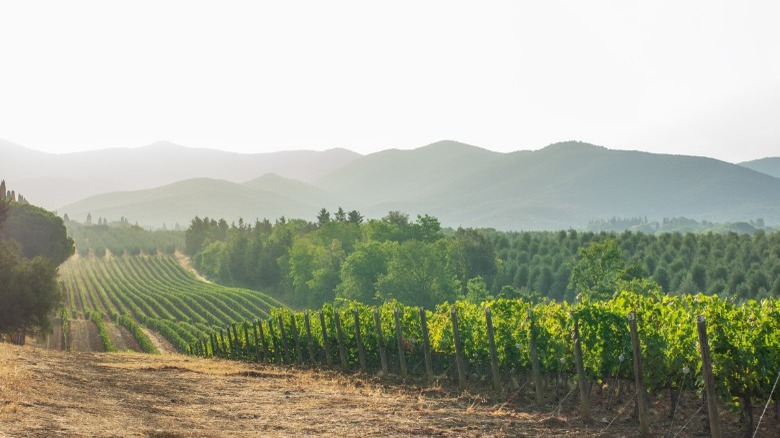What Does Clean Wine Really Mean?
The word 'clean' has been increasingly attached to things to make them seem healthier. Think of the phrase 'clean eating,' a trendy diet connected to consuming whole foods and avoiding processed items as much as possible. Now the word has invaded the alcohol market with the rising popularity of what's known as 'clean wine.' But what does it really mean? Those who believe in its supposedly innovative qualities promote clean wine as a beverage made with organic grapes and free of preservatives and unnecessary ingredients.
Actor Cameron Diaz and entrepreneur Katherine Power's clean wine brand Avaline claims to contain no added sugar, color, or concentrates. Scout & Cellar, another clean wine retailer, says that the bottles it sells are made from grapes grown sans pesticides, among other squeaky clean claims. Even the popular online retailer Thrive Market threw its hat into the ring in 2018 when it launched a clean wine shipping service — and it still sells a clean wine starter pack.
Although there's absolutely no official designation of what constitutes 'clean' wine, the trend seems to have aligned itself with themes of health and wellness. In terms of pricing, compared to a regular bottle of wine, the 'clean' stuff may make your wallet hurt a bit more. Avaline's pinot noir (notoriously expensive) is $30, and a bottle of Bookbinder Cabernet sold on Scout & Cellar's website will run you $62.
Are other wines not clean?
With all of the claims made about the excellence of clean wine, you might assume that your go-to bottle is tainted in some way. As it turns out, many of the pros of 'clean' wine are also relevant to what many would consider a regular bottle.
One of the biggest clean wine claims is that it can uniquely boast that it doesn't have any added sugar. While this may be true, in reality, any dry wine should contain little to no sugar, and if there is some, it's typically not added. In places like California and Italy, adding sugar to wine to increase its alcohol level (aka chaptalization) is illegal, so more bottles are free of it than the clean wine promoters would have you believe.
Many clean wine brands also tout their organic ingredients and the fact that they are vegan. Much like any other food product, wine that is certified organic will be labeled so — and not only 'clean' ones.
Low-sulfite wine can also be categorized as clean wine. Sulfites are inorganic salts that act as preservatives, and there's a rumor that they cause headaches. Wine cannot be sulfite-free as they're a naturally occurring compound and byproduct of fermentation processes — plus the science surrounding their connection to more severe hangovers is spotty. For those with a sensitivity, there are plenty of low-sulfite options, but it's important to note that foods like french fries contain more sulfites than a glass of wine.
What are some trustworthy ways for wine to be classified?
There are actually a number of ways for wines to be categorized that indicate their excellence — and these are verified by third parties, not celebrities. Beyond simply being organic, the Demeter Certified Biodynamic seal is centered around the idea that the entirety of the winery is seen as a living organism. The Demeter standards are strict, focusing on homegrown disease prevention and including specifications on water conservation. The Certified Biodynamic seal is recognized around the world, but only a few wineries in the States have earned the designation.
While clean wines claim superiority because of the sustainable vineyards they come from, any wine can earn a variety of seals of sustainability. The California Sustainable Winegrowing Alliance gives a Certified Sustainable stamp to vineyards and wineries in the state via a third-party audit, a distinction connected to the winery's operations in areas like pest management and emissions.
In the Pacific Northwest, wineries have the option of becoming what's called LIVE Certified, which has to do with soil health, maintaining the biodiversity of the region, and focusing on disease prevention. The Sustainability in Practice — aka SIP — seal also began in California but now reaches vineyards in other states like Michigan. SIP certification focuses on protecting human and environmental resources and is centered around its pillars of sustainability: people, planet, and prosperity. So, to find a truly sustainable bottle, look for one of these third-party seals rather than a vague notion of cleanliness.



